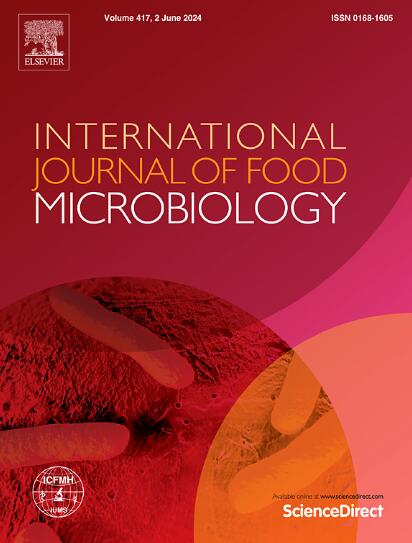抑制小肠结肠炎耶尔森菌生物膜的新型噬菌体vB_YenP_WW2的鉴定及其在鲜肉和鲜奶中的应用
IF 5.2
1区 农林科学
Q1 FOOD SCIENCE & TECHNOLOGY
International journal of food microbiology
Pub Date : 2025-09-29
DOI:10.1016/j.ijfoodmicro.2025.111468
引用次数: 0
摘要
小肠结肠炎耶尔森菌是一种重要的人畜共患病原体,可引起严重的胃肠道疾病。本研究分离并鉴定了小肠结肠炎大肠杆菌特异性噬菌体vB_YenP_WW2 (WW2)。稳定性分析表明,WW2可以在pH(4-12)和温度(4-60°C)的大范围内保持其活性。宿主范围分析表明,WW2对多种小肠结肠炎菌株具有广泛的裂解活性,裂解率为27%。在3小时内,二战有效地将生肉和牛奶中的细菌负荷降低到无法检测的水平。此外,WW2在36小时内显著抑制聚乙烯上的生物膜形成,并在18小时后使不锈钢上的生物膜形成减少70%。与先前报道的大肠杆菌噬菌体相比,WW2对大肠杆菌及其生物膜的潜伏期更短,预防作用更强。这些结果表明,WW2有望作为一种新的抗小肠结肠炎菌的抗菌剂。本文章由计算机程序翻译,如有差异,请以英文原文为准。

Characterization of a novel phage vB_YenP_WW2 for the inhibition against Yersinia enterocolitica biofilm and application in raw meat and milk
Yersinia enterocolitica is a significant zoonotic pathogen that causes severe gastrointestinal disease. In this study, vB_YenP_WW2 (WW2), a novel bacteriophage specific to Y. enterocolitica, was isolated and characterized. Stability analysis revealed that WW2 can retain its activity across a wide range of pH (4–12) and temperatures (4–60 °C). Host range analysis showed that WW2 exhibits broad lytic activity against various Y. enterocolitica strains, with a lysis rate of 27 %. Within 3 h, WW2 effectively reduced the bacterial load in raw meat and milk to undetectable levels. Additionally, WW2 significantly inhibited biofilm formation on polyethylene over 36 h and reduced biofilm formation by 70 % on stainless steel after 18 h of incubation. Compared to previously reported Y. enterocolitica phages, WW2 displayed a shorter latent period and stronger preventive effects against both Y. enterocolitica and its biofilms. These results suggested that WW2 holds promise as a novel antimicrobial agent against Y. enterocolitica.
求助全文
通过发布文献求助,成功后即可免费获取论文全文。
去求助
来源期刊
CiteScore
10.40
自引率
5.60%
发文量
322
审稿时长
65 days
期刊介绍:
The International Journal of Food Microbiology publishes papers dealing with all aspects of food microbiology. Articles must present information that is novel, has high impact and interest, and is of high scientific quality. They should provide scientific or technological advancement in the specific field of interest of the journal and enhance its strong international reputation. Preliminary or confirmatory results as well as contributions not strictly related to food microbiology will not be considered for publication.

 求助内容:
求助内容: 应助结果提醒方式:
应助结果提醒方式:


